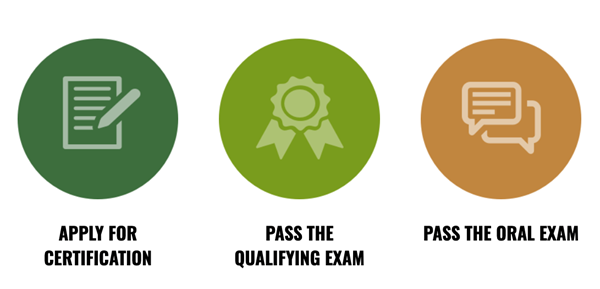Becoming board certified in Emergency Medicine by the American Board of Emergency Medicine is a simple process requiring three steps for residents who are in their final years of training.
ABEM Resident Ambassador Panel members serve 2-year terms during residency training and provide a resident perspective to ABEM activities. Working with ABEM over the past year, the 2020-2022 ABEM Resident Ambassador Panel has gained insights into the process of becoming ABEM-certified, and they have outlined those steps from their perspective in an effort to streamline your preparation for the certification process.
STEP 1: APPLYING FOR CERTIFICATION

During the last year of a resident's emergency medicine training, graduating residents destined to finish residency by Oct. 31 can access application information by signing into the ABEM initial certification page. ABEM will also send application information to the program director of the residency program, usually in April. Anyone graduating later than Oct. 31 will apply in the next application cycle. For EM residents who graduate between Nov. 1 and the following Oct. 31, it’s important to apply in the current application period. If you delay, you may need additional certification requirements, including a state medical license, if you do not have one already.
The entire application and fee payment process is online. Applications are processed as soon as they are completed.
Board eligible means that a resident graduated from an ACGME or RCPSC accredited emergency medicine program or an ABEM-approved combined program. Additionally, you must fulfill all medical licensure per ABEM policy. If you are applying directly out of residency, you do not need to hold a state medical license. This starts on the day you graduate from residency and extends to Dec. 31, 5 years after your graduation date.
STEP 2: PASSING THE QUALIFYING EXAM
 The second step in becoming ABEM board certified is to pass the qualifying examination, a computerized test with 305 multiple choice questions (with only single best answer choices). The qualifying exam is offered in about 200 Pearson testing centers across the U.S., making it easy to take the exam in the state you graduated from or plan on practicing in. The exam itself is offered during one 5-day period, typically in the fall. In order to take the exam during this time, you must schedule one 8-hour block in this 5-day period.
The second step in becoming ABEM board certified is to pass the qualifying examination, a computerized test with 305 multiple choice questions (with only single best answer choices). The qualifying exam is offered in about 200 Pearson testing centers across the U.S., making it easy to take the exam in the state you graduated from or plan on practicing in. The exam itself is offered during one 5-day period, typically in the fall. In order to take the exam during this time, you must schedule one 8-hour block in this 5-day period.
Should you be unable to attend the exam, you can cancel up to 24 hours before the start of the exam. Please arrive 30 minutes before your exam time and make sure to bring a valid form of identification. This process is similar to many of the other examinations you have taken to get to this point in your career as a physician!
The exam appointment is a total of 8 hours long, divided into 3 testing sections, each about 3 hours and 10 minutes long with a 1-hour break in between. The question topics are based on the EM Model, similar in makeup to the in-training exams, which you have likely already experienced during your residency training.
Once you have completed this qualifying examination, you can expect your score within 90 days of completion.
STEP 3: PASSING THE ORAL BOARD EXAM
 The third and final step in completing board certification is to pass the oral board examination. To be eligible, you must have passed the qualifying examination and have a state medical license. Once you pass your qualifying examination, you must take the oral board exam the next calendar year.
The third and final step in completing board certification is to pass the oral board examination. To be eligible, you must have passed the qualifying examination and have a state medical license. Once you pass your qualifying examination, you must take the oral board exam the next calendar year.
It's important to note that given the COVID-19 pandemic, there have been some changes to the implementation of this section of board certification. Notably, the examination has been offered on a virtual platform, as opposed to in-person, for the safety of test-takers and testing staff.
The oral board examination comprises 6 single patient cases, each 15 minutes long. The examiner will provide pertinent history and offer answers to the examinee’s questions. The examiner will track 8 specific markers during these patient cases. These markers include:
- Data acquisition
- Problem solving
- Patient management
- Resource utilization
- Healthcare provided or outcome
- Interpersonal relations and communication skills
- Comprehension of pathophysiology
- Clinical competence
Examiners assign a score from 1-8, with 1 being very unacceptable to 8 being very acceptable.
In addition to the 6 single patient cases, a discussion on your approach to patient care will evaluate your thought processes. Structured interviews are scored as 25 points spread across 8 stages of a typical patient interaction. These include:
- History
- Physical exam
- Differential diagnosis
- Testing
- Treatment
- Final diagnosis
- Disposition
- Transitions of care
ABEM typically releases oral board exam results within 45-60 days, and definitely within 90 days. ABEM does not use quotas or percentages to determine a passing score. Instead, after each examination, ABEM testers meet to determine the standard of care for each case and then determine whether testers passed or failed. The final passing score is then sent to the ABEM Board to determine performance expectations for a pass or fail score. ABEM does not allow for rescoring or second scoring any examinations.
SUCCESS
Once you have passed the Oral Board Examination, congratulations! You are now an ABEM board-certified emergency physician!
ABEM-certified physicians serve a valuable and irreplaceable clinical role in the care of the critically ill and injured. The delivery of emergency care is best led by physicians with EM training, experience, and ABEM certification. ABEM will support you throughout your career in continuing certification activities and promoting the important and valuable role ABEM-certified physicians bring to emergency care in the ED.
More Information
Do you have questions about the certification process? Reach out to your program director or contact ABEM at abem@abem.org. , or visit the ABEM website at abem.org/public/become-certified.



